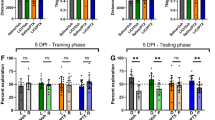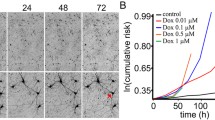Abstract
Antineoplastic drugs such as oxaliplatin (OXA) often induce memory and emotional deficits. At present, the mechanisms underlying these side-effects are not fully understood, and no effective treatment is available. Here, we show that the short-term memory deficits and anxiety-like and depression-like behaviors induced by intraperitoneal injections of OXA (4 mg/kg per day for 5 consecutive days) were accompanied by synaptic dysfunction and downregulation of the NR2B subunit of N-methyl-D-aspartate receptors in the hippocampus, which is critically involved in memory and emotion. The OXA-induced behavioral and synaptic changes were prevented by chronic oral administration of magnesium-L-threonate (L-TAMS, 604 mg/kg per day, from 2 days before until the end of experiments). We found that OXA injections significantly reduced the free Mg2+ in serum and cerebrospinal fluid (from ~ 0.8 mmol/L to ~ 0.6 mmol/L). The Mg2+ deficiency (0.6 mmol/L) upregulated tumor necrosis factor (TNF-α) and phospho-p65 (p-p65), an active form of nuclear factor-kappaB (NF-κB), and downregulated the NR2B subunit in cultured hippocampal slices. Oral L-TAMS prevented the OXA-induced upregulation of TNF-α and p-p65, as well as microglial activation in the hippocampus and the medial prefrontal cortex. Finally, similar to oral L-TAMS, intracerebroventricular injection of PDTC, an NF-κB inhibitor, also prevented the OXA-induced memory/emotional deficits and the changes in TNF-α, p-p65, and microglia. Taken together, the activation of TNF–α/NF–κB signaling resulting from reduced brain Mg2+ is responsible for the memory/emotional deficits induced by OXA. Chronic oral L-TAMS may be a novel approach to treating chemotherapy-induced memory/emotional deficits.








Similar content being viewed by others
References
Tannock IF, Ahles TA, Ganz PA, Van Dam FS. Cognitive impairment associated with chemotherapy for cancer: report of a workshop. J Clin Oncol 2004, 22: 2233–2239.
Ballenger JC, Davidson JR, Lecrubier Y, Nutt DJ, Jones RD, Berard RM, et al. Consensus statement on depression, anxiety, and oncology. J Clin Psychiatry 2001, 62 Suppl 8: 64–67.
Zhang J, Zhou Y, Feng Z, Xu Y, Zeng G. Longitudinal trends in anxiety, depression, and quality of life during different intermittent periods of adjuvant breast cancer chemotherapy. Cancer Nurs 2018, 41: 62–68.
Johnston IN, Tan M, Cao J, Matsos A, Forrest DRL, Si E, et al. Ibudilast reduces oxaliplatin-induced tactile allodynia and cognitive impairments in rats. Behav Brain Res 2017, 334: 109–118.
Hipkins J, Whitworth M, Tarrier N, Jayson G. Social support, anxiety and depression after chemotherapy for ovarian cancer: a prospective study. Br J Health Psychol 2004, 9: 569–581.
Hermelink K. Acute and late onset cognitive dysfunction associated with chemotherapy in women with breast cancer. Cancer 2011, 117: 1103; author reply 1103–1104.
Silberfarb PM. Chemotherapy and cognitive defects in cancer patients. Annu Rev Med 1983, 34: 35–46.
Gothelf D, Rubinstein M, Shemesh E, Miller O, Farbstein I, Klein A, et al. Pilot study: fluvoxamine treatment for depression and anxiety disorders in children and adolescents with cancer. J Am Acad Child Adolesc Psychiatry 2005, 44: 1258–1262.
Fountzilas E, Krishnan E, Janku F, Fu S, Karp DD, Naing A, et al. A phase I clinical trial of hepatic arterial infusion of oxaliplatin and oral capecitabine, with or without intravenous bevacizumab, in patients with advanced cancer and predominant liver involvement. Cancer Chemother Pharmacol 2018, 82: 877–885.
Konner J, Schilder RJ, DeRosa FA, Gerst SR, Tew WP, Sabbatini PJ, et al. A phase II study of cetuximab/paclitaxel/carboplatin for the initial treatment of advanced-stage ovarian, primary peritoneal, or fallopian tube cancer. Gynecol Oncol 2008, 110: 140–145.
Vogelzang NJ, Torkelson JL, Kennedy BJ. Hypomagnesemia, renal dysfunction, and Raynaud’s phenomenon in patients treated with cisplatin, vinblastine, and bleomycin. Cancer 1985, 56: 2765–2770.
Hodgkinson E, Neville-Webbe HL, Coleman RE. Magnesium depletion in patients receiving cisplatin-based chemotherapy. Clin Oncol (R Coll Radiol) 2006, 18: 710–718.
Fakih M. Management of anti-EGFR-targeting monoclonal antibody-induced hypomagnesemia. Oncology (Williston Park) 2008, 22: 74–76.
Rodriguez-Moran M, Guerrero-Romero F. Elevated concentrations of TNF-alpha are related to low serum magnesium levels in obese subjects. Magnes Res 2004, 17: 189–196.
Meyers CA, Albitar M, Estey E. Cognitive impairment, fatigue, and cytokine levels in patients with acute myelogenous leukemia or myelodysplastic syndrome. Cancer 2005, 104: 788–793.
Yang M, Kim J, Kim JS, Kim SH, Kim JC, Kang MJ, et al. Hippocampal dysfunctions in tumor-bearing mice. Brain Behav Immun 2014, 36: 147–155.
Taniguchi K, Karin M. NF-kappaB, inflammation, immunity and cancer: coming of age. Nat Rev Immunol 2018, 18: 309–324.
Slutsky I, Abumaria N, Wu LJ, Huang C, Zhang L, Li B, et al. Enhancement of learning and memory by elevating brain magnesium. Neuron 2010, 65: 165–177.
Ying YL, Wei XH, Xu XB, She SZ, Zhou LJ, Lv J, et al. Over-expression of P2X7 receptors in spinal glial cells contributes to the development of chronic postsurgical pain induced by skin/muscle incision and retraction (SMIR) in rats. Exp Neurol 2014, 261: 836–843.
Wang J, Liu Y, Zhou LJ, Wu Y, Li F, Shen KF, et al. Magnesium L-threonate prevents and restores memory deficits associated with neuropathic pain by inhibition of TNF-alpha. Pain Physician 2013, 16: E563–575.
Abumaria N, Yin B, Zhang L, Li XY, Chen T, Descalzi G, et al. Effects of elevation of brain magnesium on fear conditioning, fear extinction, and synaptic plasticity in the infralimbic prefrontal cortex and lateral amygdala. J Neurosci 2011, 31: 14871–14881.
Liu G, Weinger JG, Lu ZL, Xue F, Sadeghpour S. Efficacy and safety of MMFS-01, a synapse density enhancer, for treating cognitive impairment in older adults: A randomized, double-blind, placebo-controlled trial. J Alzheimers Dis 2016, 49: 971–990.
Serefko A, Szopa A, Poleszak E. Magnesium and depression. Magnes Res 2016, 29: 112–119.
Zhang XL, Ding HH, Xu T, Liu M, Ma C, Wu SL, et al. Palmitoylation of delta-catenin promotes kinesin-mediated membrane trafficking of Nav1.6 in sensory neurons to promote neuropathic pain. Sci Signal 2018, 11.
Gui WS, Wei X, Mai CL, Murugan M, Wu LJ, Xin WJ, et al. Interleukin-1beta overproduction is a common cause for neuropathic pain, memory deficit, and depression following peripheral nerve injury in rodents. Mol Pain 2016, 12.
Detke MJ, Rickels M, Lucki I. Active behaviors in the rat forced swimming test differentially produced by serotonergic and noradrenergic antidepressants. Psychopharmacology (Berl) 1995, 121: 66–72.
Leung LW. Orthodromic activation of hippocampal CA1 region of the rat. Brain Res 1979, 176: 49–63.
Abernethy MH, Fowler RT. Micellar improvement of the calmagite compleximetric measurement of magnesium in plasma. Clin Chem 1982, 28: 520–522.
De Simoni A, My Yu L. Preparation of organotypic hippocampal slice cultures: interface method. Nature Protocols 2006, 1: 1439–1445.
Phelps EA. Human emotion and memory: interactions of the amygdala and hippocampal complex. Curr Opin Neurobiol 2004, 14: 198–202.
Ren WJ, Liu Y, Zhou LJ, Li W, Zhong Y, Pang RP, et al. Peripheral nerve injury leads to working memory deficits and dysfunction of the hippocampus by upregulation of TNF-alpha in rodents. Neuropsychopharmacology 2011, 36: 979–992.
Lee YS, Silva AJ. The molecular and cellular biology of enhanced cognition. Nat Rev Neurosci 2009, 10: 126–140.
Xu T, Li D, Zhou X, Ouyang HD, Zhou LJ, Zhou H, et al. Oral application of magnesium-L-threonate attenuates vincristine-induced allodynia and hyperalgesia by normalization of tumor necrosis factor-alpha/nuclear factor-kappaB signaling. Anesthesiol 2017, 126: 1151–1168.
Terrando N, Monaco C, Ma D, Foxwell BM, Feldmann M, Maze M. Tumor necrosis factor-alpha triggers a cytokine cascade yielding postoperative cognitive decline. Proc Natl Acad Sci U S A 2010, 107: 20518–20522.
Himmerich H, Fulda S, Linseisen J, Seiler H, Wolfram G, Himmerich S, et al. Depression, comorbidities and the TNF-alpha system. Eur Psychiatry 2008, 23: 421–429.
Fourrier C, Bosch-Bouju C, Boursereau R, Sauvant J, Aubert A, Capuron L, et al. Brain tumor necrosis factor-alpha mediates anxiety-like behavior in a mouse model of severe obesity. Brain Behav Immun 2019, 77: 25–36.
Euston DR, Gruber AJ, McNaughton BL. The role of medial prefrontal cortex in memory and decision making. Neuron 2012, 76: 1057–1070.
Belleau EL, Treadway MT, Pizzagalli DA. The impact of stress and major depressive disorder on hippocampal and medial prefrontal cortex morphology. Biol Psychiatry 2019, 85: 443–453.
Gibson EM, Monje M. Emerging mechanistic underpinnings and therapeutic targets for chemotherapy-related cognitive impairment. Curr Opin Oncol 2019.
McKee JA, Brewer RP, Macy GE, Borel CO, Reynolds JD, Warner DS. Magnesium neuroprotection is limited in humans with acute brain injury. Neurocrit Care 2005, 2: 342–351.
Li Y, Liu J, Liu X, Su CJ, Zhang QL, Wang ZH, et al. Antidepressant-like action of single facial injection of botulinum neurotoxin A is associated with augmented 5-HT levels and BDNF/ERK/CREB pathways in mouse brain. Neurosci Bull 2019, 35: 661–672.
Yang CY, Chiu HF, Tsai SS, Wu TN, Chang CC. Magnesium and calcium in drinking water and the risk of death from esophageal cancer. Magnes Res 2002, 15: 215–222.
Tukiendorf A, Rybak Z. New data on ecological analysis of possible relationship between magnesium in drinking water and liver cancer. Magnes Res 2004, 17: 46–52.
Romani AM. Cellular magnesium homeostasis. Arch Biochem Biophys 2011, 512: 1–23.
Meffert MK, Baltimore D. Physiological functions for brain NF-kappaB. Trends Neurosci 2005, 28: 37–43.
Shipton OA, Paulsen O. GluN2A and GluN2B subunit-containing NMDA receptors in hippocampal plasticity. Philos Trans R Soc Lond B Biol Sci 2014, 369: 20130163.
Acknowledgements
This work was supported by the National Natural Science Foundation of China (31771166).
Author information
Authors and Affiliations
Corresponding authors
Ethics declarations
Conflict of interest
The authors claim that there are no conflicts of interest.
Electronic supplementary material
Below is the link to the electronic supplementary material.
Rights and permissions
About this article
Cite this article
Zhou, X., Huang, Z., Zhang, J. et al. Chronic Oral Administration of Magnesium-L-Threonate Prevents Oxaliplatin-Induced Memory and Emotional Deficits by Normalization of TNF-α/NF-κB Signaling in Rats. Neurosci. Bull. 37, 55–69 (2021). https://doi.org/10.1007/s12264-020-00563-x
Received:
Accepted:
Published:
Issue Date:
DOI: https://doi.org/10.1007/s12264-020-00563-x




